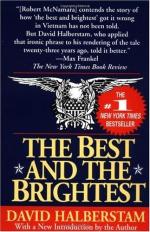
|
| Name: _________________________ | Period: ___________________ |
This test consists of 15 multiple choice questions and 5 short answer questions.
Multiple Choice Questions
1. What does Halberstam say General Westmoreland was asking President Johnson for, now that he was in control of Vietnam?
(a) More time.
(b) More combat troops.
(c) More bombers.
(d) More fighter jets.
2. What does Halberstam say the U.S. assured its generals during their meeting in Vietnam?
(a) That they would not cross the border into Cambodia.
(b) That they would be victorious by the end of 1966.
(c) That they would continue humanitarian aid.
(d) That they would continue aid in the event of a coup.
3. What movement regarding the war does Halberstam say started at the University of California in Berkeley?
(a) The balanced budget movement.
(b) The Civil Rights movement.
(c) The Free Speech Movement.
(d) The peace movement.
4. What does Halberstam say was Lyndon Johnson's feeling about the coup?
(a) He proposed it.
(b) He turned a blind eye to it.
(c) He endorsed it.
(d) He opposed it.
5. When does Halberstam say the Johnson administration realized that Bundy was necessary to their planning?
(a) When they had a hard time while he was on vacation.
(b) When Diem was overthrown, as Bundy had predicted he would be.
(c) When McNamara's plans were ineffectual.
(d) When Taylor's theories were proven wrong.
6. What does Halberstam say affected the American attitude toward the war?
(a) The American media coverage.
(b) The civil rights struggle in America.
(c) International resistance to the war.
(d) The American election schedule.
7. Why does Halberstam say that September and October of 1963 were good for the Kennedy administration?
(a) The military made progress in the Mekong Delta.
(b) There was accord on civil rights issues.
(c) The administration was prepared to pick up seats in special elections.
(d) Averell Harriman made progress on the test ban treaty.
8. Who tipped off Senator Wayne Morse about the real situation of the Gulf of Tonkin incident?
(a) President Johnson.
(b) McGeorge Bundy.
(c) General Westmoreland.
(d) An anonymous caller.
9. What plan was the U.S. government following by the end of 1964?
(a) Limit bombing but increase troops on the ground.
(b) Restrict operations to bombing missions.
(c) Pour as many resources as necessary into Vietnam.
(d) Expand the pacification program.
10. What does Halberstam say happened to Diem and Nhu after they fled?
(a) They were captured and killed.
(b) They returned to power.
(c) They reached America and settled there.
(d) They were granted haven in Japan.
11. What does Halberstam say was the Joint Chiefs of Staff's perception of the problem in Vietnam?
(a) They were planning to solve it with a coup.
(b) They thought it could be resolved diplomatically.
(c) They thought it was a military problem.
(d) They thought it could be solved by bombing.
12. How does Halberstam say the Americans responded when the Vietcong attacked Pleiku?
(a) They decided to withdraw.
(b) They decided to reevaluate their strategy.
(c) They decided to retaliate.
(d) They put more troops on the ground.
13. What does Halberstam say happened when control shifted out of Taylor's hands in March and April 1965?
(a) Reports began to be issued with greater frequency.
(b) Reports began to describe American troops' atrocities.
(c) Reports began to reduce estimations of Vietcong troop strength.
(d) Reports began to be closer to actual realities.
14. Who was the only administration insider arguing against escalation?
(a) Averell Harriman.
(b) George Ball.
(c) Maxwell Taylor.
(d) McGeorge Bundy.
15. What were people calling for by Thanksgiving 1964, in Halberstam's account?
(a) Victory at all costs.
(b) Escalation.
(c) Withdrawal.
(d) Surrender.
Short Answer Questions
1. What does Halberstam say was the outcome of the report on the bombing attacks?
2. What does Halberstam say was the result of the Spring Offensive?
3. What plan was the U.S. government preparing for by the end of 1964?
4. What does Halberstam say Maxwell Taylor discovered was true about Khanh?
5. In what way does Halberstam say that Lyndon Johnson resembled Kennedy in his management style?
|
This section contains 725 words (approx. 3 pages at 300 words per page) |

|




